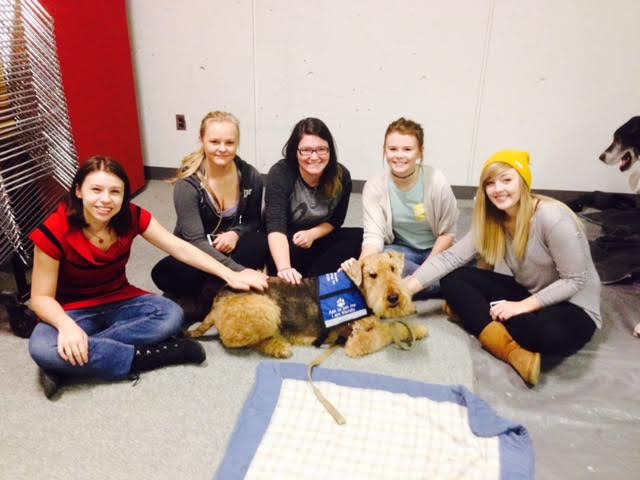
In difficult times, it’s hard to stay positive. Humans tend to dwell on events and it can be difficult to cope. There are types of animals trained for this job. There are service animals, emotional support animals and facility animals.
A service animal can be a dog and, if chosen, a miniature horse. Miniature horses can pull up to three times their weight. These animals are individually trained to address the needs of someone with a disability. These animals are there to help keep the person who is unable to be alert and perform everyday tasks such as picking things up that have been dropped, reminding a person to take medication, and even pressing an elevator button.
Emotional Support animals are also known as a comfort animal. They are there to comfort and help a person with a mental illness such as anxiety or depression. They are not considered a service animal. Emotional Support animals are not licensed and are not trained. These animals are typically everyday pets.
Facility animals are mainly located in a clinical setting. Animals like dogs, cats, birds and fish help patients who are hospitalized for a long period of time. Animals often belong to employees who bring these animals in everyday. They have dogs come in at Bronson and Borgess hospitals for the sick who need a quick cheering-up.
“I went through a breakup and it was like my dog could sense it, and she was just all over me. She wanted to comfort me and just it seemed like she wanted to make me feel better,” said senior Kia Anderson.
Michele Edison works for the West Michigan Therapy dogs located in Grand Rapids Michigan. They are a non-profit organization who works with children, teens and adults. They provide animal assisted activities and animal assisted therapy. She has a dog named Watson that helps her with her work.
“Dogs are great for emotional trauma. They have dogs that go to a house fire site to help comfort the family. Dogs can also keep secrets. I have had a young boy come to read with Watson one day. I asked him what was bothering him. He said he just found out his parents were getting a divorce. So I told him that Watson was very good at keeping secrets and he would like to whisper something to Watson that he wasn’t comfortable saying to another person,” Edison continued. “He leaned over and whispered in Watson ear. No, I couldn’t hear what he had to say. Then he gave Watson a big hug, he had a huge smile and then was interested in continuing with his reading that day.”
She has also worked with an organization that puts dogs and Veterans with PTSD (post traumatic stress disorder) together.
“ PTSD people usually have a hard time integrating into society. However when they have their dog with them, they feel very confident doing things they wouldn’t do otherwise,” Edison said.
She explained how these animals can help anyone who has gone through trauma and things in their lives that have affected them in a negative way.
“ The dog provides companionship and love, it helps the person by lowering their blood pressure and knowing that the dog is their best friend. Their dog will take care of them.” Edison continued, “I’ve seen first hand how a Vet with PTSD may become agitated, and as soon as they reach down to touch their dog and pet them they ease up and come back down to a calm self and can focus on what is going on.”
The studies of animal therapy started in the 1990’s, and has grown into a career. Animal therapy has been accepted into everyday psychology.
“Animals are a great way to connect with a person. I see it as the animal being a tool for a regular nurse, doctor, therapist, and etc. To use an animal as a tool to help the person or patient to move forward in their therapy,” said Edison.
Animals are just there for us when we need them, pets, and trained service animals. They are our emotional support. Animals are more important than we think, and we need them more than we know.







